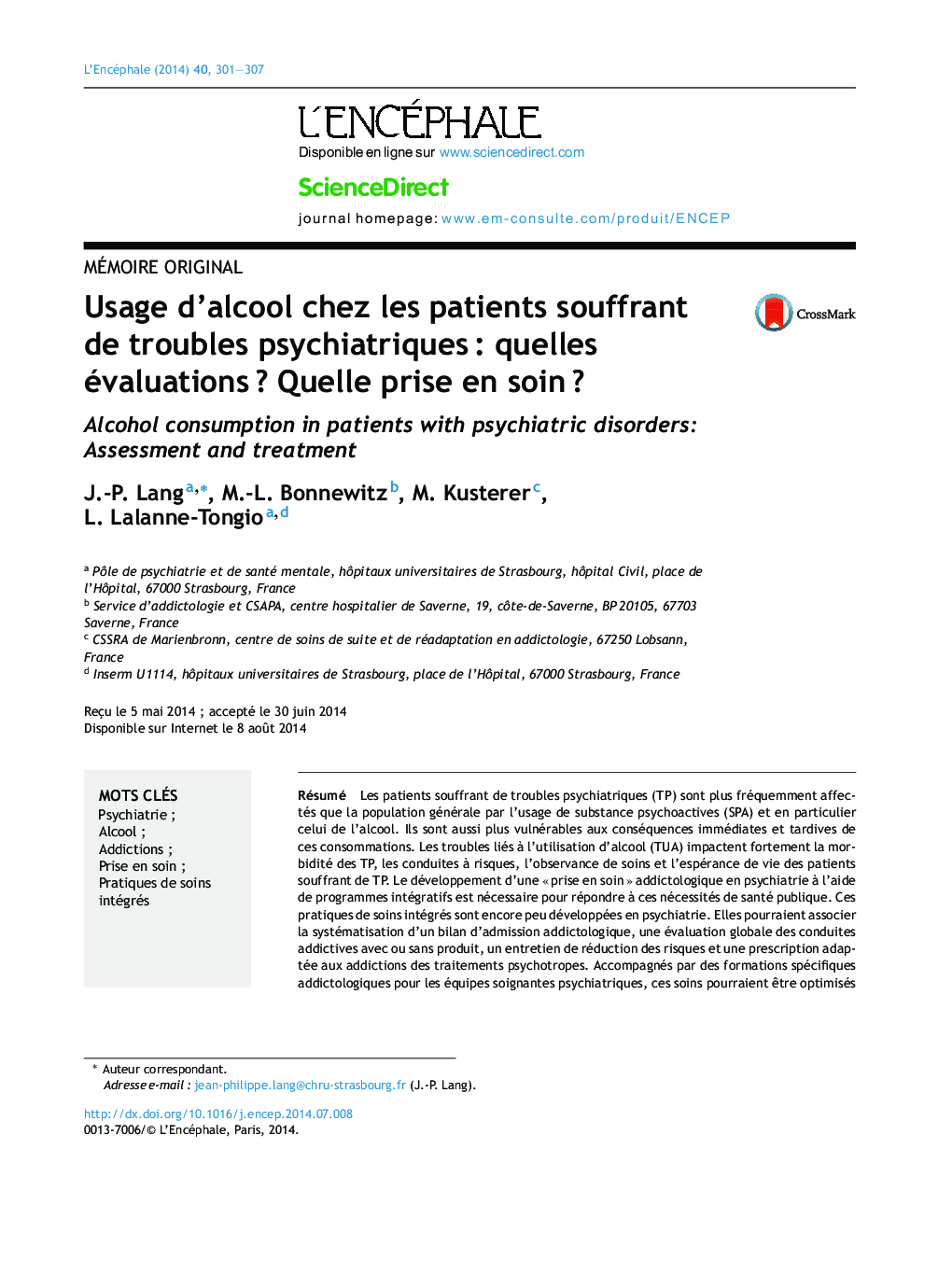| کد مقاله | کد نشریه | سال انتشار | مقاله انگلیسی | نسخه تمام متن |
|---|---|---|---|---|
| 4181781 | 1277143 | 2014 | 7 صفحه PDF | دانلود رایگان |
عنوان انگلیسی مقاله ISI
Usage d'alcool chez les patients souffrant de troubles psychiatriques : quelles évaluations ? Quelle prise en soin ?
دانلود مقاله + سفارش ترجمه
دانلود مقاله ISI انگلیسی
رایگان برای ایرانیان
کلمات کلیدی
موضوعات مرتبط
علوم پزشکی و سلامت
پزشکی و دندانپزشکی
روانپزشکی و بهداشت روانی
پیش نمایش صفحه اول مقاله

چکیده انگلیسی
Alcohol consumption in France exceeds the European average (12.7 L of pure alcohol/habitant/year in 2009 for an average of 12.5 L). This consumption has a major professional, social and health impact on the individuals and their families. The cost of such, estimated in Europe to be of 155.8 billion Euros in 2010, is the highest among the central nervous system diseases in Europe, far higher than that of depression or dementia. Patients suffering from psychiatric disorders are more frequently affected by problems related to alcohol use than the general population. They are also more vulnerable to the immediate and subsequent consequences of their consumption. The alcohol related disorders that are often accompanied by risk taking and other addictive behaviour require a global assessment of the addiction, with and without substance, and of the complications. These have a strong impact on risk taking, compliance with care, and the morbidity of somatic and psychiatric disorders, as well as access to optimal care and the life span of patients suffering from psychiatric disorders. The development of addictology care, with integrative treatment programs, is recommended in response to these public health issues. Nevertheless, specific addictology practices and partners with addictology care structures are still scarcely developed in psychiatry. Firstly, it would be necessary to set up such integrated treatments through the systematisation of an “addictology” checkup on admission, a global assessment of addictive behaviour and cognitive disorders, using pragmatic tools that are user-friendly for the care teams, maintain the reduction in risk taking, and apply prescriptions for addiction to psychotropic treatments, in liaison with the referring general practitioner. As early as possible, accompanied by specific training in addictology for the psychiatrists and the mental health nursing teams, such care could be enhanced by the development of liaison and advanced psychiatric consultation teams, specialised in addictology, together with the installation of a addictology care network in supplementary psychiatry of levels 1, 2 and 3 in addictology. This network of specific care would notably permit the integrated management of patients suffering from acute psychiatric disorders or requiring care under constraint. More specific care networks for particular problems (maternity issues, adolescence, HIV and hepatitis, cognitive disordersâ¦) and programs of therapeutic education could reinforce this proposal within a protocol of care that should be legible, coherent and coordinated. The psychiatrist and the addictologist must therefore learn to work together over and above the dogmatic boundaries and positioning in a constructive and efficient partnership, beneficial for the patient.
ناشر
Database: Elsevier - ScienceDirect (ساینس دایرکت)
Journal: L'Encéphale - Volume 40, Issue 4, September 2014, Pages 301-307
Journal: L'Encéphale - Volume 40, Issue 4, September 2014, Pages 301-307
نویسندگان
J.-P. Lang, M.-L. Bonnewitz, M. Kusterer, L. Lalanne-Tongio,